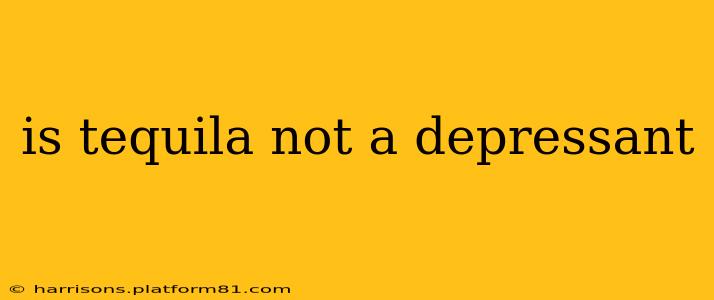Is Tequila Not a Depressant? Understanding Tequila's Effects
Tequila, like all alcoholic beverages, is a depressant. This isn't a matter of opinion; it's a scientifically established fact. The misconception that tequila might be different stems from its often celebratory association and the sometimes-intense initial effects, which can feel stimulating. However, these initial feelings are a temporary masking of the depressant effects of the alcohol itself.
Let's break down why this is the case and address some common questions:
How Does Tequila Act as a Depressant?
Tequila's primary active ingredient is ethanol, the same alcohol found in other liquors, beer, and wine. Ethanol affects the central nervous system, slowing down brain activity. This slowdown manifests in several ways:
- Reduced Inhibitions: The initial feeling of "loosening up" is actually a result of impaired judgment and reduced control over impulses.
- Impaired Coordination: As the alcohol concentration in the bloodstream increases, coordination suffers, impacting motor skills and reaction time.
- Slowed Reaction Time: This is a significant safety concern, particularly when driving or operating machinery.
- Slurred Speech: The alcohol's effects on the brain's motor control centers lead to difficulties in articulation.
- Drowsiness and Sedation: In higher doses, tequila can induce drowsiness and even unconsciousness.
Does Tequila's Type or Purity Affect its Depressant Properties?
The type of tequila (blanco, reposado, añejo) or its purported purity doesn't change the fundamental fact that it contains ethanol, a central nervous system depressant. While different tequilas might have varying flavors and aromas due to production methods, the alcohol content remains the key factor determining its depressant effects. A higher percentage of alcohol will lead to more pronounced depressant effects.
Why Does Tequila Sometimes Feel Stimulating Initially?
The initial feeling of stimulation or energy some people experience with tequila is likely due to a combination of factors:
- The Placebo Effect: Expectations and social context can influence how people perceive the effects of alcohol.
- Dehydration and Electrolyte Imbalance: Alcohol is a diuretic, leading to dehydration. Dehydration can mimic some symptoms of stimulation before the depressant effects fully kick in.
- Individual Differences in Metabolism: People metabolize alcohol at different rates. Those who metabolize it slower may experience a delayed onset of depressant effects.
What are the Long-Term Effects of Excessive Tequila Consumption?
Chronic excessive tequila consumption, like any excessive alcohol consumption, carries serious health risks:
- Liver Damage: Cirrhosis and other liver diseases are potential long-term consequences.
- Heart Problems: Increased risk of heart disease and stroke.
- Mental Health Issues: Increased risk of depression and anxiety.
- Addiction: Alcohol dependence or alcoholism is a significant concern.
Is it safe to mix tequila with other substances?
Mixing tequila with other substances, including other drugs or medications, can be extremely dangerous and potentially lethal. The combined effects can be unpredictable and significantly increase the risk of overdose or adverse reactions. It's always best to avoid mixing substances.
In conclusion, despite initial feelings that might seem contrary, tequila is undoubtedly a depressant. Understanding this is crucial for responsible consumption and making informed decisions about alcohol use. Always drink responsibly and in moderation, and never drink and drive.
